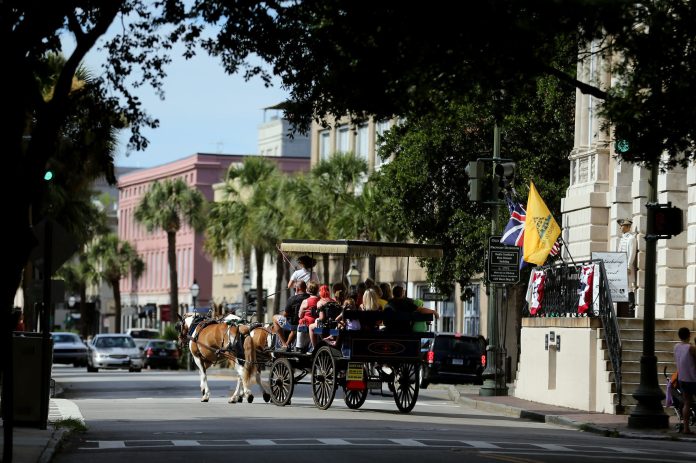By Briah Lumpkins and Doug Pardue
brlumpkins@postandcourier.com
dpardue@postandcourier.com
Promoting Charleston as one of the world’s top tourist attractions has cost taxpayers nearly $150 million during the last two decades, and they have no way to know exactly where the money went.
That’s because the state and local governments that gave away that cash have failed to seek an exact accounting from the Charleston Area Convention & Visitors Bureau. The nonprofit, more commonly known as Explore Charleston, uses taxpayers’ money to advertise the Lowcountry’s virtues to attract vacationers.
Explore Charleston and similar destination marketing organizations across the state run almost entirely on the public’s dime without the financial transparency normally required by the government.
The money generated from tourism is significant. Cities, towns and counties across South Carolina have collected more than $942 million in accommodations tax money since 2004. That would be enough to pay the tuition of 18,812 in-state students to the College of Charleston for four years.
By law, the accommodation tax money is directed to about two dozen designated marketing organizations across the state and can only be used to promote tourism. The tax funneled $7.8 million to Explore Charleston this fiscal year alone.
So what exactly does that money buy? It’s almost impossible to say.
A 2018 S.C. Supreme Court ruling exempted organizations, such as Explore Charleston, from having to share their financial records with the public. But to hold them accountable, the ruling placed the burden on local governments to obtain financial documents from these organizations and monitor their spending. Unlike designated marketing organizations, the local governments that provide them money are subject to the Freedom of Information Act.
The Supreme Court’s ruling has effectively cloaked in secrecy the spending of millions of dollars in tax money across the state.
This has increasingly become a problem for some of the local governments Explore Charleston represents. In Isle of Palms, officials have publicly called for more transparency and complained they aren’t getting their fair share. A Port Royal resident is suing the organization, demanding receipts. And outside Charleston, similar debates have erupted in places like Berkeley County and Blythewood.
Glenda Nemes recently resigned from the Isle of Palms advisory board because she felt Explore Charleston was not addressing the needs of the beachfront barrier island that lies about 18 miles northeast of Charleston.
“We have absolutely no say in what’s given to Explore Charleston,” she contends. “We have taxation without representation.”
Lynn S. Teague, vice president of the nonpartisan League of Women Voters of South Carolina, said the League also sees it as a problem. “Any time public money is involved, there should be real transparency. The public should know exactly where that money went, and they should know ahead of time.”
Jay Bender, a media lawyer and expert on the state’s Freedom of Information Act, agreed: “When public money can be spent without public oversight, it is more than likely to be misused,” he said.
Tourism marketing organizations similar to Explore Charleston have steadily spread across South Carolina and the nation in recent decades. They are credited with helping expand some local and state economies by bringing in tourist money and investment. A recent study by Oxford Economics found that designated marketing organizations that coordinate their “efforts with economic development initiatives are better positioned to compete for new investments, corporate relocations and a talented workforce.”
But some critics remain uneasy about the veiled nature of these promotional practices as the amount of accommodation tax money has grown with few details about how it’s being spent.
Local leaders in the Isle of Palms aren’t alone in their concern. Berkeley County pulled accommodation tax money from its Chamber of Commerce earlier this year over spending transparency issues. In the capital city of Columbia, some leaders are pushing to redirect a portion of tourism marketing money to fix up parks. And in the Midlands community of Blythewood, suspicions linger after an accountant in 2018 found the local Chamber of Commerce was misusing accommodation tax money and providing financial documents that were “confusing.”
During the past two years, The Post and Courier has teamed with 18 community news organizations to investigate questionable conduct by government officials throughout South Carolina. The resulting Uncovered stories have repeatedly shown how lax government oversight and diminished transparency with public money can lead to inefficiencies, overspending and misuse of taxpayer dollars.
Concerns about Explore Charleston grew after its 2019 federal financial filings revealed that the organization had about $2 million socked away in an offshore bank account in the Cayman Islands. Readers sent in tips asking Uncovered reporters to investigate.
Explore Charleston CEO Helen Hill readily admitted in an interview with The Post and Courier that it “sounds shady” to have an account in the Caymans. But, she said, the purpose was entirely above-board. Her agency used the account to help complete a financial arrangement for British Airways to launch regular nonstop passenger service between Charleston and London. That service began in 2019 but was suspended the next year because of the COVID-19 pandemic. It has not resumed.
Hill said the offshore account was set up to hold British pounds sterling so that the money wouldn’t lose value because of currency exchange rate fluctuations.
She said the nonprofit isn’t trying to be overly secretive. She said she’s willing to hand over anything she’s required to.
“We will provide whatever documents are required by law,” Hill said.
She said the reason she tries to keep spending details as confidential as possible is to protect the secret sauce of tourism promotion that has helped make Charleston an international tourism hot spot.
But by keeping this hidden, taxpayers are left in the dark about exactly how Explore Charleston uses their money to pay for international trips, advertisements in the country’s top travel publications, hotel stays or what they eat and drink while there.
Attempts to change funding arrangements for designated marketing organizations across the country have resulted in long — and costly — legal battles in places such as San Diego and Tulsa. And in Florida’s Palm Beach County, two top leaders of Discover Palm Beach County resigned after an audit revealed “gross mismanagement” that allowed its comptroller to embezzle $1.5 million.
No one has accused Explore Charleston of such nefarious conduct. But an Uncovered investigation into the nonprofit revealed:
— The Charleston Area Convention & Visitors Bureau has never provided a forensic audit or receipts to show exactly where the tax money it receives is spent, what it’s spent on or who spent it.
— The state board in charge of overseeing tourism organizations failed for years to ask for and review spending documents from the Charleston nonprofit until last fall. This failure occurred even after the state oversight board was advised to do so by a state Supreme Court decision and two advisory opinions from South Carolina’s attorney general.
— Two members of the state oversight committee also sit on Explore Charleston’s board of governors, where they review and approve many of the nonprofit’s actions. This places the two in the unusual position of then overseeing for the state whether Explore Charleston acted properly on decisions they already may have approved.
— Only Isle of Palms, of the 10 local governments that direct accommodation tax money to Explore Charleston, was able to provide The Post and Courier with an itemized breakdown of how their accommodation tax money was spent. Nine others only received broad spending statements, often lumping together millions of dollars in expenditures.
— Two municipalities, Sullivan’s and Seabrook islands, said they hadn’t received any financial or budgetary documentation from Explore Charleston until after The Post and Courier filed Freedom of Information Act requests for the materials.
— Charleston County’s contract with Explore Charleston gives the county the right to send an independent auditor to examine the nonprofit’s financial records. But the county never sent anyone to do so.
Selling charm, history and beaches
Tourism is in many ways the lifeblood of South Carolina’s economy, responsible for an estimated $24 billion in annual economic impact that supports about one of every 10 jobs, according to state studies. And few places reap the benefit of that flood of visitors more than Charleston and the surrounding Lowcountry.
Stroll the streets of downtown Charleston, and you can be sure to bump shoulders with tourists from across the country. They can be found gazing at the grand houses on The Battery. Or posing for impromptu photo-ops against the pastel colors of Rainbow Row. Or riding on horse-drawn carriages with the clicking of hooves on the cobblestone streets.
Charleston’s charm, historic sights and vibrant dining scene are part of the reason it’s been voted the No. 1 city in the U.S. by Travel + Leisure readers for 10 years in a row. Explore Charleston has made it its mission to promote that carefully cultivated image in glossy venues such as Travel + Leisure magazine and Southern Living to draw even more visitors.
Charleston now boasts of bringing in 7 million tourists a year, up by 2 million since 2015, according to statistics from the College of Charleston Office of Tourism analysis. That’s nine tourists for every resident in the metro area.
Leading the charge of Lowcountry tourism promotion is Helen Hill and Explore Charleston.
It’s almost impossible to talk about the organization without Hill. She began selling ads for its visitors guide in 1986, a year after its founding, and she made a quick ascent, rising to the top job as executive director in 1989. She still holds that title 33 years later. Last year, she collected a salary of $229,135.
Hill also serves on numerous boards across the Lowcountry, including Beacon Community Bank and Counselors of Real Estate. In addition, she is chairwoman of the Charleston County Aviation Authority, which manages the state’s largest airport.
Hill can often be found in a solid-colored statement suit jacket, a variation of pearls draped around her neck and gold and silver charms dangling from her wrists.
Her passion for Charleston is evident in presentations and conversations with local leaders. When she walked into a July Isle of Palms City Council meeting, everyone seemed to know her. Their eyes lit up as they greeted her with hugs and smiles before catching up on old times. Generally, Hill’s attentive in conversation, never breaking eye contact. She possesses an ability to speak with complete strangers like she’s known them for years. In many ways, Hill is the personification of Southern hospitality.
With so much success, Hill said she finds herself frustrated by recent questioning of her organization’s transparency. But the truth is, she doesn’t want people to know how she makes the magic happen. In her eyes, she’s not required to provide forensic audits of her organization or spending receipts. “If it’s supposed to be public, we will make it public,” Hill said of providing receipts to local governments. “But we don’t have to break it down … Do I want my competition in another state to know it? Probably not.”
Her sentiment was affirmed four years ago in the South Carolina Supreme Court case DomainsNewMedia vs. The Hilton Head Chamber of Commerce. The high court ruled that nonprofit convention bureaus, such as Explore Charleston, were not subject to the state’s Freedom of Information Act. Normally, organizations that receive public tax money must follow requirements of the open records law.
Instead, the Supreme Court placed the responsibility on the local governments that fund these designated marketing organizations to hold them accountable for their spending and emphasized that those governments are subject to the state’s Freedom of Information Act.
But in Explore Charleston’s case, none of the local governments have asked for detailed accounting, such as spending receipts, Hill acknowledged.
Some clues have emerged from the records obtained through Explore Charleston’s 990s — required IRS financial filings for nonprofits. Since 2015, for example, the nonprofit has paid the companies that have owned Travel + Leisure magazine more than $8 million. Explore Charleston has paid Conde Nast, which owns Conde Nast Traveler magazine, $6.7 million during the same stretch of time.
It remains unclear how many ads or promotions that money supported. But both publications have named Charleston the top city and small city in the U.S. for visitors. Explore Charleston’s spokesperson said the titles came from a vote by the publication’s readers.
“The title of best U.S. City cannot be bought,” he said in an email to the Post and Courier. “So, no, (Explore Charleston) has never purchased the title,”
Representatives of the two publications could not immediately be reached for comment on their dealings with Explore Charleston.
Whether such efforts result in more visitors traveling to Charleston than would have come anyway is impossible to measure, according to Daniel Guttentag, who runs a tourism analysis unit at the College of Charleston. Still, Guttentag maintains that such efforts are needed and that tourism promotion should be viewed as a long-range investment. His unit provides many of the statistics Explore Charleston uses to tout its success.
Guttentag points out that when Colorado became the only state to get rid of its tourism marketing function in 1993, the state saw a loss of $1.4 billion annually in tourism revenue. It reinstated the marketing in 2000.
Charleston’s tourism fortunes have gone nowhere but up in recent decades. During the last 10 years, Explore Charleston’s overall budget has more than doubled to about $24 million this year.
With this growth, some local government leaders, such as those on the Isle of Palms, want to see more of their accommodation tax money used specifically toward advertising or promotions that highlight their communities.
Hill said this places Explore Charleston in a difficult position. The nonprofit’s goal is to sell the highest number of room nights at the highest price throughout the greater Charleston area, she said.
“Are we going to be together or are we not?” she asked. The idea is to promote the whole area, not just parts of it, to lift it all.
Explore Charleston and its money
The Charleston Area Convention & Visitors Bureau was founded in 1985 and operated under the umbrella of the Charleston Metro Chamber of Commerce until they split in 2002.
At its start, Explore Charleston represented the city and county of Charleston. Now, it’s in charge of maximizing tourism for two counties and eight municipalities.
Explore Charleston has three main sources for its revenue: accommodation tax and state grants, which generally account for about two-thirds of its revenue, and private memberships and publications, such as a wedding and visitors guide, make up much of the rest.
Accommodation tax is its key source of cash. Money flows from a 2 percent state tax tacked onto most Charleston area hotels and short-term lodgings bills. The state collects the tax and returns it to the local governments where it was added to guests’ bills. Those governments keep most of it — part in their general funds and part in a special fund for tourism-related expenditures. The rest, about 30 percent, goes directly to Explore Charleston to be used strictly for tourism promotion and advertising.
State records and nonprofit filings make it fairly easy to track the streams of taxpayer money pouring into Explore Charleston. But divining where those millions go from there remains a much greater challenge given the opaque nature of the organization’s records.
Lacking accountability
In an effort to solve that mystery, The Post and Courier turned to the local governments tasked with holding Explore Charleston accountable for its use of public tax dollars.
Explore Charleston is required by law to provide these governments with a budget for approval before the beginning of each fiscal year and a year-end accounting of how that money was spent.
In June, The Post and Courier filed Freedom of Information Act requests with each of the 10 local governments that fund Explore Charleston asking to see the last six years of the nonprofit’s budgets and year-end audits.
Some local governments were able to provide the documents for all the years requested, while others only had a few. Two of the local governments said they had never received any financial documents until Explore Charleston hand-delivered them shortly after the newspaper filed its Freedom of Information Act requests. Most also receive a brochure detailing Explore Charleston’s successes.
The financial documents provided to local leaders contained few specifics on spending, relying more on general categories such as “destination marketing” and “media relations.” The year-end audit also lists expenses by general category, such as “destination advertising and promotions.”
Sullivan’s Island comptroller Jason Blanton was among those who received a stack of financial documents from Explore Charleston after The Post and Courier began asking questions. It was the first time in his 17 years working for the island that he could recall receiving such records, he said.
Blanton scanned several of the documents and then studied one of the year-end audits.
“That’s very vague,” he said of the records. “This is pretty much boilerplate. What did they spend it on? I’d want a whole lot more back-up.”
Most of the other local officials contacted by The Post and Courier didn’t seem to share his apprehension. They expressed no, or very little, concern about the lack of specificity in the records as to how their tax money was spent.
What financial documents?
For much of its existence, Explore Charleston has operated with little scrutiny from the local governments that help underwrite its operations.
Many officials said they are happy with the organization’s success, noting the throngs of tourists that swarm the region each year. In 2021 alone, Explore Charleston credited its work with having a more than $10 billion economic impact on the Greater Charleston area, based on statistics from the Office of Tourism Analysis.
Some officials also said they don’t have the time or resources to deeply examine the organization’s spending.
Charleston City Councilman Peter Shahid Jr. serves on Explore Charleston’s board of governors. He said he receives financial reports from the nonprofit but relies on Explore Charleston to handle the money properly.
As a councilman who serves on multiple boards, Shahid said he doesn’t have the time to review detailed expense reports from every organization to which the City of Charleston provides public money.
“We do rely on them being fiscally responsible and fiscally honest with the city,” he said of these organizations. “But I don’t know of any council member who has the opportunity to spend the time to go through a daily, monthly, weekly, annual transaction report of these agencies. I’ve never heard of that.”
Charleston Mayor John Tecklenburg and Folly Beach Mayor Tim Goodwin said their cities have great relationships with Explore Charleston. Although the budgets they receive aren’t detailed down to the item, they said they trust the nonprofit’s decision-making.
“They more than meet the requirements,” Tecklenburg said of Explore Charleston’s financial reporting.
In Charleston County, setting up contracts requiring independent audits with those who receive its funding is standard practice, according to Clerk of Council Kristen Salisbury. Although the county’s contract with Explore Charleston allows it to send an internal auditor to look at the organization’s books, the county has never seen any reason to do so, she said.
A better way?
South Carolina law does not specify how detailed the budgets and audits provided by destination marketing organizations must be. Nor does it require that such organizations submit receipts, invoices or credit card transactions for review by local governments.
Other states require more scrutiny of these organizations and their spending.
Consider the North Carolina mountain city of Asheville. With a comparable tourism promotion budget of more than $27 million, the Explore Asheville Convention and Visitors Bureau works as a quasi-governmental arm of the Buncombe County Tourism Development Authority. Explore Asheville is subject to an intense auditing process, a spokesperson for the nonprofit said.
The nonprofit must upload receipts for every transaction to the county. The county reviews these receipts while also examining invoices and submissions of credit card transactions. In addition, Explore Asheville undergoes an external audit every year.
In the nation’s casino capital, The Las Vegas Convention and Visitors Authority also operates as an arm of local government, according to a spokesman for the organization. Its board of governors is composed of political and hospitality leaders in the area. The board reviews the organization’s expenditures, and it receives detailed audits annually that are approved. These audits are uploaded online for the public’s viewing.
Though the law doesn’t require it, some South Carolina designated marketing organizations also go a step further in providing transparency.
The Myrtle Beach Area Chamber of Commerce and Convention and Visitors Bureau posts spreadsheets on its website, providing a detailed accounting on how accommodation tax money from Myrtle Beach, Horry County and its tourism development fee funds were used.
These records include details such as the name of the company, a short memo about the purchase and the amount of money spent. These reports are uploaded on a quarterly and yearly basis.
Still, some feel that true accountability comes from receipts detailing exactly how the money was spent.
That’s what Skip Hoagland, founder of DomainsNewMedia, was after when he filed a lawsuit against the Hilton Head Chamber of Commerce in 2013. He alleged that public funding to promote tourism enabled the organization to unfairly compete with local media businesses such as his for advertising dollars.
When he filed a Freedom of Information Act request for access to the Chamber’s financial documents, he was denied. This case went all the way to the state Supreme Court, which ultimately ruled in the favor of designated marketing organizations allowing them to keep their expenses private.
Mare Baracco also challenged these opaque practices when she filed a lawsuit against Explore Charleston last June, demanding access to their receipts. She contends that Explore Charleston opened itself to South Carolina’s Freedom of Information law when it entered into an annual contract with Charleston County, allowing an external auditor to review all of the nonprofit’s financial records at any time. Her case is still pending.
The Port Royal resident said she’s not doing this for herself but because the public has a right to know how its tax money is spent.
“I’m more upset for my community that we have to go through this process,” she said. “I’m looking to create transparency.”
Oversight delayed
Kiawah Island Treasurer Dorota Szubert wasn’t troubled by the lack of spending specificity when she received Explore Charleston’s proposed budget last fall. That was because an email from the tourism group’s leaders indicated that the plan had already been approved by the state oversight board that reviews tourism spending.
“I wouldn’t question them,” Szubert said.
It’s unclear if local government leaders knew that two members of that oversight panel, including its chairman, also serve on the 32-member governing board of Explore Charleston — essentially, reviewing their own organization’s handiwork.
Ed Riggs and Dan Blumenstock, local hospitality leaders, have both served on the state Tourism Expenditure Review Committee and Explore Charleston’s governing board simultaneously since 2002 and 2013, respectively.
Both said they don’t consider their serving on both boards as a problem. That’s because they don’t usually vote on documents submitted from the local governments that fund Explore Charleston, they said.
But both said they gave advice to Hill on whether Explore Charleston’s newly created budget plan would meet the state oversight board’s reporting requirements. According to Hill, the two told her that the plan “not only met, but exceeded” the board’s expectations.
Not everyone agreed. After presenting the plan to local accommodation tax leaders on Isle of Palms last October, some officials were unsatisfied and claimed it lacked specificity.
Ethics experts contacted by The Post and Courier were divided about whether the pair’s service on the two panels poses concerns because they do not stand to financially benefit from the arrangement. Still, Greg Adams, the founding director of the Program on Judicial Ethics, Selection, Accountability and Independence and former University of South Carolina professor, feels the two members have put themselves in a tough spot.
“I think that these two members that gave advice to the CEO have created a conflict of interest for themselves,” Adams said. “What position are they going to take when the statewide body is deciding whether or not the Charleston Area Convention and Visitors Bureau’s budget is sufficiently detailed to be able to be used at the end of the fiscal year? And if they have adhered to that budget?”
The Post and Courier’s investigation also found that until last year, the Tourism Expenditure Review Committee, the board set up by state law to oversee the spending of accommodation tax money, had never reviewed spending by the state’s designated marketing organizations. That’s because the committee had interpreted state law to mean it did not have to review those organizations’ finances, only the accommodation tax spending by the local governments, according to review committee member Riggs.
The review committee made that interpretation even though the Accommodation Tax statute, enacted in July 1984, mandates that the committee examine “all questionable tourism-related expenditures.”
They stuck with this interpretation even after two Attorney General opinions — one in 2002 and the other in 2015 — said that the state oversight board has the obligation to review tourism money spent by designated marketing organizations across the state.
Attorney General opinions are not binding but are used to guide government bodies.
The 2018 state Supreme Court case DomainsNewMedia.com vs. Hilton Head-Bluffton Chamber of Commerce emphasized that the state oversight committee is the final of three review levels to ensure the money is spent properly.
When asked why the state oversight board waited until last fall to start reviewing these records, its leadership provided conflicting responses.
Riggs said that the Supreme Court case prompted the change, but that ruling came down three years earlier. A spokesperson for the state oversight board said that the Tourism Expenditure Review Committee was not a party in the court case, so it saw no need to act at the time.
“How was our money spent?”
At its July meeting, The Isle of Palms Accommodation Tax Advisory Committee found itself at odds as they watched their guest speaker arrive at the podium.
Laurie Smith, Explore Charleston’s chief operating officer, presented the nonprofit’s largest budget to date — a $24 million plan to promote area tourism.
Smith’s presentation sparked a heated back and forth between committee members. Half were satisfied with the details in the presentation. Others wanted to see more specifics.
Advisory board Chairman Ray Burns and fellow member Doug Truslow had, for months, demanded a more detailed accounting about how the island’s money was being spent by Explore Charleston. Their central concern: Isle of Palms provides Explore Charleston with more accommodation tax money than any other beach municipality, but the pair could not see what benefit the island was getting.
Of the $826,528 in island money set aside for Explore Charleston, less than half — $319,105 — was earmarked for promoting the island alone through social media campaigns, website development and a 30-second commercial. The rest is to be spent promoting tourism to the greater Charleston area.
“We have said for quite a while that we want to see our money spent to the benefit of the Isle of Palms,” Burns said during the meeting. “And we want to see accountability and traceability of where our money is being spent.”
Members Gloria Clarke and Barb Bergwerf disagreed. They didn’t see the need for a constant back and forth with Explore Charleston, given that state law required that the money be spent on promoting tourism.
“We have no choice,” Bergwerf said. “We have to spend it.”
The panel deadlocked on whether to approve Explore Charleston’s budget, which meant it went to city council without a recommendation.
In the end, it didn’t matter.
Two weeks later, Isle of Palms’ City Council approved the budget. The council didn’t really have a choice. The money must go to a designated marketing organization, and Explore Charleston is the only game in town.













